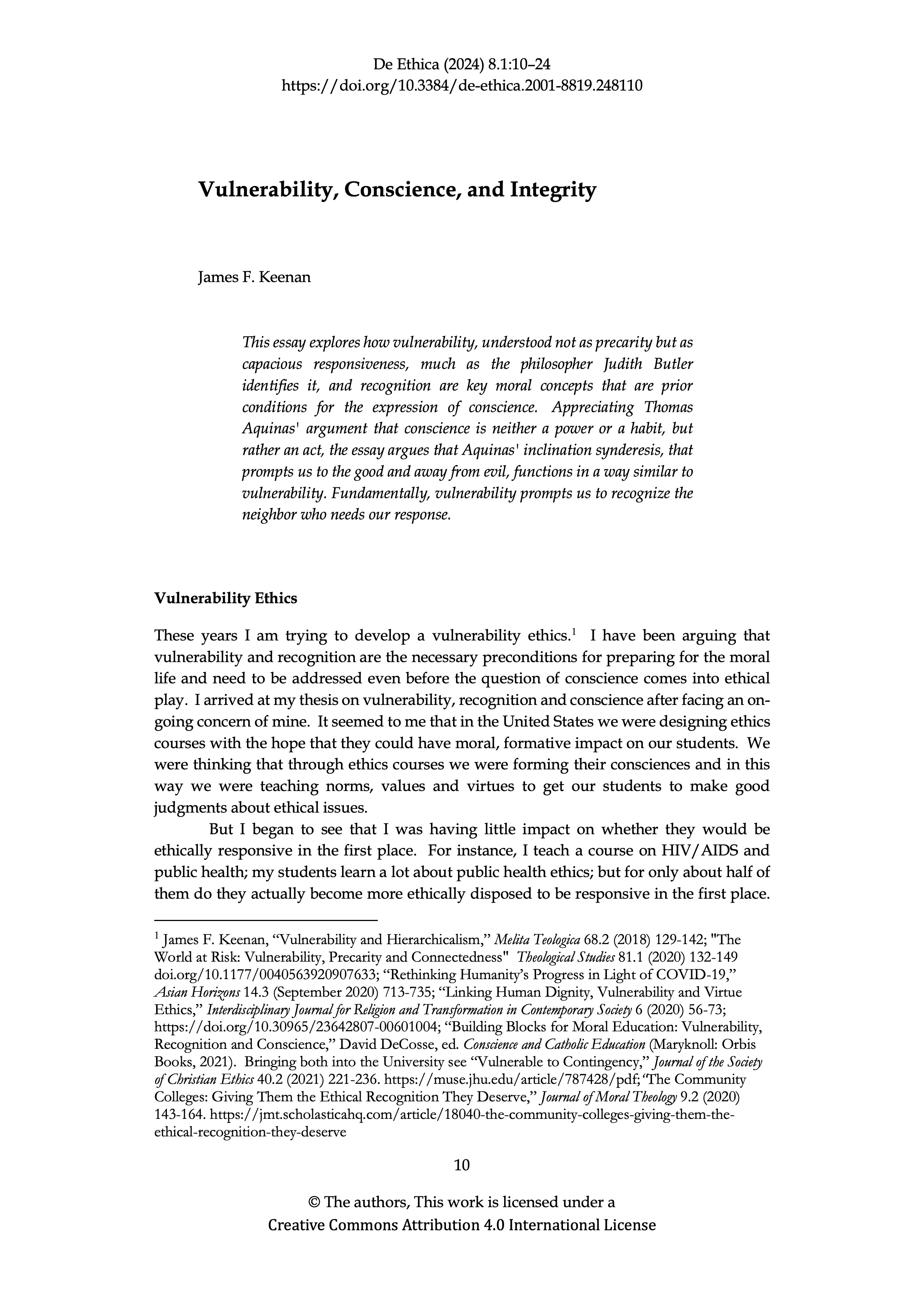Vulnerability, Conscience, and Integrity
DOI:
https://doi.org/10.3384/de-ethica.2001-8819.248110Keywords:
vulnerability, recognition, grievability, Black Lives Matter, conscience, synderesisAbstract
This essay explores how vulnerability, understood not as precarity but as capacious responsiveness, much as the Philosopher Judith Butler identifies it, and recognition are key moral concepts that are prior conditions for the expression of conscience. Appreciating Thomas Aquinas' argument that conscience is neither a power or a habit, but rather an act, the essay argues that Aquinas' inclination synderesis, that prompts us to the good and away from evil, functions in a way similar to vulnerability. Fundamentally, vulnerability prompts us to recognize the neighbor who needs our response.
References
Aquinas, Thomas. Commentary on Romans.
Aquinas, Thomas. Quaestiones Disputatae De Virtutibus.
Benjamin, Jessica. Beyond Doer and Done to: Recognition Theory, Intersubjectivity and the Third. New York: Routledge, 2017.
Benjamin, Jessica. The Bonds of Love: Psychoanalysis, Feminism, and the Problem of Domination. New York: Pantheon, 1988.
Butler, Judith. Notes Toward a Performative Theory of Assembly. Cambridge: Harvard University Press, 2015.
Butler, Judith. Precarious Life: The Power of Mourning and Violence. Brooklyn: Verso, 2004.
Butler, Judith. “Precarious Life, Vulnerability, and the Ethics of Cohabitation”, The Journal of Speculative Philosophy 26:2 (2012), pp. 134–151.
Butler, Judith, Zeynep Gambetti, and Leticia Sabsay. Vulnerability in Resistance. Durham: Duke University Press, 2016.
Choi, Ki Joo. Disciplined by Race: Theological Ethics and the Problem of Asian American Identity. Eugene: Cascade Books, 2019.
De Anda, Neomi. “Spirit of Community: Forced Vulnerability, the Little Details as realized hope and Lament as prophetic protest”. Lecture, Duquesne University, October 5, 2021.
Equal Justice Initiative. “Reconstruction in America: Racial Violence after the Civil War”, Equal Justice Initiative, online at https://eji.org/report/reconstruction-in-america/ (accessed 2023-12-7).
Gilson, Erinn. The Ethics of Vulnerability: A Feminist Analysis of Social Life and Practice. New York: Routledge, 2014.
Haker, Hille. “The Fragility of the Moral Self”, Harvard Theological Review 97:4 (2004), pp. 359–381.
Haker, Hille. “Recognition and Responsibility”, Religions 12:7 (2021), p. 467.
Haker, Hille. Towards a Critical Political Ethics: Catholic Ethics and Social Challenges. Würzburg: Echter Verlag, 2020.
Hogan, Linda. Keeping Faith with Human Rights. Washington, D.C.: Georgetown University Press, 2015.
Hogan, Linda. “Vulnerability: An Ethic for a Divided World”, in Building Bridges in Sarajevo: The Plenary Papers of Sarajevo 2018, edited by James F. Keenan, Kristin Heyer, and Andrea Vicini. Maryknoll: Orbis Books, 2019.
Keenan, James. “Building Blocks for Moral Education: Vulnerability, Recognition and Conscience”, in Conscience and Catholic Education, edited by David DeCosse. Maryknoll: Orbis Books, 2021.
Keenan, James. “The Color Line, Race and Caste: Structures of Domination and the Ethics of Recognition”, Theological Studies 82:1 (2021), pp. 69–94.
Keenan, James. “The Community Colleges: Giving Them the Ethical Recognition They Deserve”, Journal of Moral Theology 9:2 (2020), pp. 143–164.
Keenan, James. “Linking Human Dignity, Vulnerability and Virtue Ethics”, Interdisciplinary Journal for Religion and Transformation in Contemporary Society 6 (2020), pp. 56–73.
Keenan, James. “Rethinking Humanity’s Progress in Light of COVID-19”, Asian Horizons 14:3 (2020), pp. 713–735.
Keenan, James. “Vulnerability and Hierarchicalism”, Melita Teologica 68:2 (2018), pp. 129–142.
Keenan, James. “Vulnerable to Contingency”, Journal of the Society of Christina Ethics 40:2 (2021), pp. 221–236.
Keenan, James. “Vulnerability, Hierarchicalism, and Recognition”, in Clericalism and Sexuality, edited by Philip McCosker, Luigi Gioia, and Travis LaCouter. Cambridge: Cambridge University Press, forthcoming.
Keenan, James. “The World at Risk: Vulnerability, Precarity and Connectedness”, Theological Studies 81:1 (2020), pp. 132–149.
LaCocque, Andre. Onslaught against Innocence: Cain, Abel and the Yahwist. Cambridge: James Clarke & Co, 2010.
Leclerq, Vincent. Blessed are the Vulnerable: Reaching out to Those with AIDS. New London: Twenty-Third Publications, 2010.
Levinas, Emmanuel. Difficult Freedom: Essays on Judaism. London: Athlone Press, 1990.
Mackenzie, Catriona, Wendy Rogers, and Susan Dodds. Vulnerability: New Essays in Ethics and Feminist Philosophy. New York: Oxford University Press, 2013.
Mahoney, Jack. The Holy Spirit and Moral Action in Thomas Aquinas. Lanham: Rowman and Littlefield, 2021.
Mathewes, Charles. “Vulnerability and Political Theology”, in Exploring Vulnerability, edited by Heikke Springhart and Günther Thomas. Bristol, Connecticut: Vandenhoeck & Ruprecht, 2017.
McLaughlin, Eliott. “Three videos piece together the final moments of George Floyd’s life”, CNN, June 23, 2020, online at https://www.cnn.com/2020/06/01/us/george-floyd-three-videos-minneapolis/index.html (accessed 2023-12-9).
Niebuhr, Reinhold. Moral Man and Immoral Society. Louisville: Westminster John Knox Press, 2001.
Osheim, Amanda. “Vulnerable as Christ: Privilege and the Kenotic Marks of the Church”. Lecture, Duquesne University, October 5, 2021.
Tessman, Lisa. Burdened Virtues: Virtue Ethics for Liberatory Struggles. New York: Oxford University Press, 2005.
Vermeulen, Karolien. “Mind the Gap: Ambiguity in the Story of Cain and Abel”, Journal of Biblical Literature 133:1 (2014), pp. 29–42.
Wilkerson, Isabel. Caste: The Origins of Our Discontent. New York: Random House, 2020.

Downloads
Published
How to Cite
Issue
Section
License
Copyright (c) 2024 James Keenan

This work is licensed under a Creative Commons Attribution 4.0 International License.
